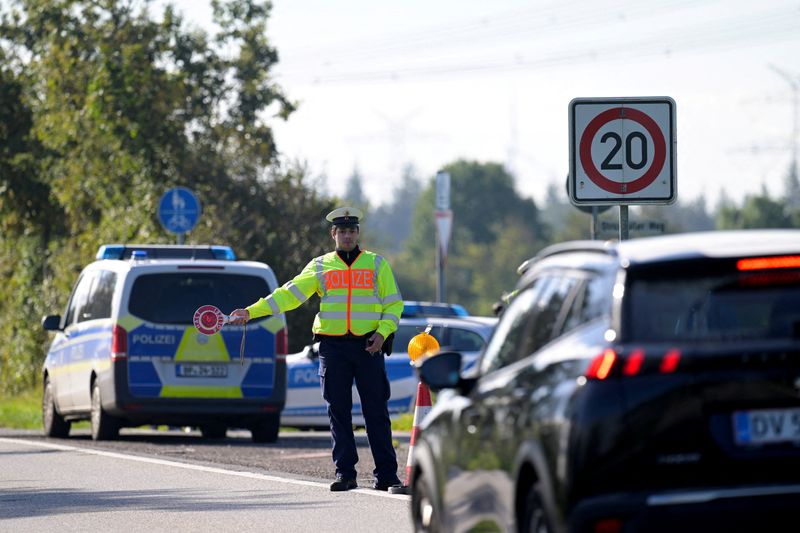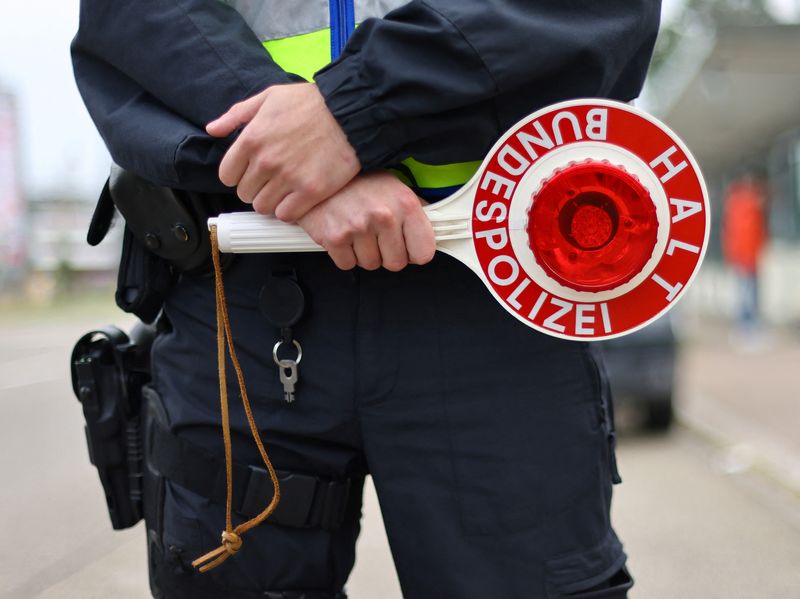By Riham Alkousaa
BERLIN (Reuters) -Germany reintroduced temporary border checks including at its frontiers with France and the Netherlands on Monday as part of efforts to combat irregular migration and cross-border crime.
The coalition government has toughened its stance on migration following a surge in arrivals, in particular people fleeing war and poverty in the Middle East, and a rise in support for the opposition far-right and conservatives.
The measures have, however, sparked concern among migration experts, who question their long-term effectiveness, suggesting they are more symbolic than substantive.
"The signal is deterrence - an attempt to demonstrate the ability to act," said Hans Vorlaender, chairperson of Germany's expert council on integration and migration.
While the border controls may be a short-term deterrent, smuggling networks often find new routes, Vorlaender said, adding that a more sustainable solution would be to process migrants asylum applications at the EU's external borders.
RIGOROUS CHECKS
On Germany's eastern border, at the bridge connecting the town of Frankfurt-Oder with Slubice in Poland, a German police officer stood at control points, managing the flow of traffic and ensuring rigorous border checks.
"That's the right thing to do, the right way. It just should have happened much earlier," said passerby, Kerstin Rubelt.
But the measure sparked a small protest by pro-asylum activists in the town, with a dozen carrying signs reading: "Open Hearts, Open Minds, Open Borders".
"The question of whether someone comes here illegally or whether someone is a criminal is not the decisive question; the decisive question is racism, which is also promoted and triggered by this," Rene Pachmann, Catholic university chaplain at European University Viadrina, told Reuters.
DOUBTS OVER EFFECTIVENESS
The border controls are being reintroduced at a time when Germany has seen a 21.7% drop in asylum applications in the first eight months of the year.
Interior Minister Nancy Faeser attributed the decline to controls introduced last year, which prevented over 30,000 unauthorised entries.
However, migration experts interviewed by Reuters said it is difficult to prove the decrease was a direct result of those measures.
The new controls primarily target asylum seekers coming from neighbouring EU countries, invoking the EU's Dublin rules, which require asylum applications to be processed in the first EU country of arrival.
Marc Speer, a sociologist at bordermonitoring.eu, noted that only 30% of asylum applications in Germany are Dublin cases.
Marcus Engler, from the German Center for Integration and Migration Research (DeZIM), said migration patterns are typically shaped by a range of factors, including political upheavals at home and shifts in EU and national policy.
"It's challenging to scientifically assess how these border controls influence the arrival of irregular migrants," he said.
Germany remains committed to EU asylum laws and provides individual procedures for asylum claims, which makes it an attractive destination, said Maximilian Pichl, an asylum law professor at RheinMain University of Applied Sciences.
Existing migration networks and communities in Germany continue to draw migrants, he said.
CRITICISM
The checks now extend to northern and western borders with countries also including Belgium, Luxembourg and Denmark, adding to existing controls at crossings with Poland, the Czech Republic, Austria, and Switzerland.
On Monday, traffic at the borders was reported to be flowing smoothly. However, the new controls have faced criticism from Germany's neighbours including Poland and Austria.
Critics argue that the reintroduced controls jeopardise the EU's principle of free movement and risk undermining solidarity within the bloc.
In Schengen, Luxembourg, the birthplace of borderless Europe, resident Lucien Max doubted the measures would be effective and was concerned about their impact on commuters.
"I doubt if they really catch those people who need to be caught. It is more of a nuisance than something that helps."
German federal police will carry out checks flexibly, the interior ministry said, focusing on minimising disruptions to commuters, travellers, and trade.
However, with limited policing resources, selective checks described as "smart controls" by the ministry may lead to racial profiling, experts warn.

"These checks are usually directed against people of colour. Studies show that such random checks can open the door to racial profiling," said Pichl.
The German interior ministry on Monday reiterated that racially motivated police actions are unacceptable and unlawful.
